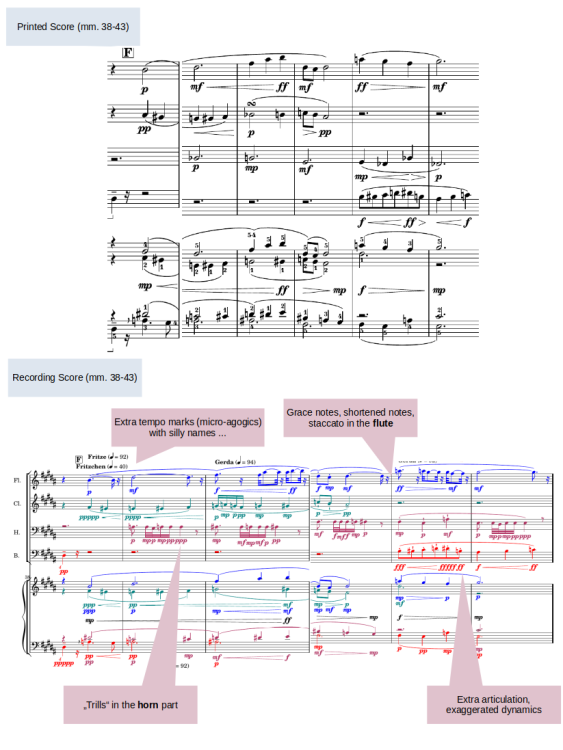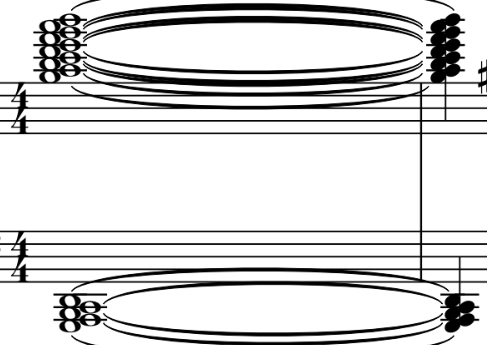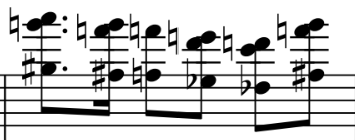All Activity
- Today
-
First the short answer: Thank you for your profound review! I’m impressed how thoroughly you listen to the pieces finding out the least details and accurately identify the weaknesses. Yes, there are some grace notes and other small, detailed differences between the score and the recording. Now the detailed answer: Something about how I work when composing. I use lilypond as the notation software which is quite different than the most other ones. Rather than having a Graphical User Interface the music is typed in in a text file – similarly to writing a computer program. The lilypond software than produces the score and a MIDI file from that input, whereas the MIDI file is afterwards used to produce the recording applying soundfonts for the respective instruments. I do not use any virtual instrument plugins to polish the final recording, clicking on different knobs and controls. Since the recording from the plain MIDI file sounds boring and unrealistic, I started to write different versions (with „ifdefs“) in my lilypond source file, one intended for the printed score and one for the recording, where I for example add fingerings for the printed score and more exact and detailed articulation, dynamics, agogics and arpeggiation for the final music to be hered. For the latter case I slip into the role of the interpreter/performer writing down exactly – note by note – how I would phrase or articulate a distinct passage, how trills, arpeggios or ornamentations would be performed exactly etc. The resulting performance-score is therefore overloaded and nearly unreadable, but it gives a visual feedback with which details a human player would perform the piece. And the most benefit of this approach is, that this final polishing is reproducible whenever I make some corrections/changes in the piece, since both the composition as is and the performing hints reside together in on source file. I think this approach is permissible and reflects the reality. A human performer does literally not play one note as written in the score, but introduces that kind of microdynamic, microagogics or microarticulation deviations which finally produces the intended interpretation. What concerning the actual piece, I made such deviations especially for the flute and the horn. I don’t have experience with woodwind instruments, only that „virtual“ ones coming from listening the output from the MIDI file and the respective soundfonts. I discovered the following effects I wanted to mitigate with my „microarticulation“: The flute has only a small range of dynamics and when playing „medium long notes“ (in this case quarter notes) the sound was sometimes very unrealistic (i.e. MIDI like). So I introduced the grace notes as a kind of interpretation or ornamentation of the flute-player puppet which, in my taste, worked around well. The horn was difficult with long notes, the sound became louder and louder the longer the tone was played, as least with the soundfonts I tried out. I don’t know – and therefore formulated as a question – does the horn behave so in reality? To mitigate that loud blaring, I reduced the dynamics of the long notes drastically and sometimes I introduced a „trill“ to stop that loud blaring sound.
-

YCF Composition Competition - Halloween 2025 (Submission)
Henry Ng Tsz Kiu replied to UncleRed99's topic in Chamber Music
Just relisten to it and I love the C minor version more 😁 -
I am the opposite. I am never able to imagine the whole piece of music in my head at once. I may have some ideas and planning towards my music, but whether it works or not, I will have to try and write them down. Usually when I start writing, the music tells me what and how they want to be expressed-they simply write themselves out, and usually it's much better and bigger than what I thought or planned beforehand. I am just the midwife of my music and never the real creator of it. Maybe it's from heaven or other places, but definitely not from me. I am still in awe with the emotional power the Sextet brings me to, and I still don't really think it's written by me to be honest. Henry
- 1 reply
-
- 1
-

-
I've encountered a very interesting (and very long) article about "aphantasia" or the inability to see mental images in the New Yorker: Some people can't see mental images. The consequences are profound. (I had to read the article on my cell phone since if I tried to open it on my computer it would require me to get a subscription to the New Yorker.) Summary of the article: Some people can't visualize mental images. This has been dubbed aphantasia after Aristotle coined the term phantasia as the ability to fantasize. But there is a wide spectrum for this ability from hyper-phantasia or the ability to experience abnormally vivid mental imagery to aphantasia or the inability to do so. And this isn't limited to visual imagery but to all of the senses including hearing music, touch, taste or smell. Supposedly, children are born hyper-phantasic and lose the ability gradually through the pruning of neurons in the brain during normal brain development (although some people claim to have been born with aphantasia). I have very vivid memories of being able to imagine whole new pieces of music as a child, complete with a full complex instrumentation/orchestration. I would do this before falling asleep and it was this memory which I attribute to my finding the passion to learn how to compose music later in life. The article also talked about how children who actively bolster their ability to daydream, fantasize or imagine things can stay hyper-phantasic into adulthood. Perhaps this is how Mozart was able to foster his ability to compose and remember music completely in his head. But the question I want to pose for you is whether this kind of ability is something that it is better or worse to have for a composer. I've heard of many composers who have had the ability to hear a whole piece of music in their head all at once, with full orchestration and they always seemed frustrated because they lacked the ability to capture the music on paper or in their sequencer/DAW or notation software. The music just sprung into existence so spontaneously that it proved difficult to capture. It seems that if you don't also develop a great musical memory then the ability to imagine the whole composition in your head all at once is ultimately futile. I have also been diagnosed with a mental illness and it was around that time that I started losing some of my hyper-phantasia. To me, that explains why I had to switch to writing music on paper as the music was now being composed at basically the same pace as I wrote it, not any faster or slower. It was definitely a qualitative shift in the way I wrote music. Before, the whole piece would be finished in the amount of time it took to imagine it. Now, I was never sure how the piece would turn out until I actually sat down to write it. I think there's definitely advantages to both ways of writing. But for me I found that I couldn't be as easily disappointed by my work when I composed in this way. People think that aphantasia is a disease or a disorder, but there is a wide spectrum and I think everyone's gotta learn to take the best advantage of whatever kind of gifts that they may have. Thanks for reading and I'd love to hear what you think! P.S.: This article was recommended to me by my friend Lisa who has aphantasia and bought me my own Muzoracle set and Chromatic Harmonica. So thanks again Lisa!
- 1 reply
-
- 2
-

-
Henry Ng Tsz Kiu started following I wrote some variations on Dies Irae for string quartet
-

Poll - 2025 Halloween Competition
Henry Ng Tsz Kiu replied to PeterthePapercomPoser's topic in Monthly Competitions
-
.thumb.png.8b5b433a341551e913a34392660bc95b.png)
Poll - 2025 Halloween Competition
PeterthePapercomPoser replied to PeterthePapercomPoser's topic in Monthly Competitions
Henry, since you are in Hong Kong you forget that you're living in the future! LoL He actually has 30 hours before he has to finish his reviews! haha -

Poll - 2025 Halloween Competition
Henry Ng Tsz Kiu replied to PeterthePapercomPoser's topic in Monthly Competitions
You can still do it, there are 6 hours left to finish them and earn the "Ardent Reviewer" badge!! Of course you can do it later, but you will lose the badge!! 😘 -
UncleRed99 started following Poll - 2025 Halloween Competition
-

Poll - 2025 Halloween Competition
UncleRed99 replied to PeterthePapercomPoser's topic in Monthly Competitions
Hey Peter. Sorry I ended up missing out these last few days of the month. Personal-side issues, on quite a severe level, have had my focus diverted on them rather than here. Since Music is more of a Hobby for me, I'm unable to prioritize it often. I will still go through and provide feedback for the pieces I missed, as time permits, for the sake of integrity and following through with what I helped to plan for the forum with you all. 🙂 - Yesterday
-

Poll - 2025 Halloween Competition
Kvothe replied to PeterthePapercomPoser's topic in Monthly Competitions
Hi, I just caught up. I just reviewed Max and Uncle reed. -

Poll - 2025 Halloween Competition
Kvothe replied to PeterthePapercomPoser's topic in Monthly Competitions
@PeterthePapercomPoser Just did those! Thanks! -

YCF Composition Competition - Halloween 2025 (Submission)
Kvothe replied to UncleRed99's topic in Chamber Music
entry: Ghost Town Requiem Melodies Themes Motives Harmony Chords Textures Form Development Structure Time Originality Creativity Score Presentation Instrumentation Orchestration Playability Execution of Given Challenge Taste 10 8 10. 10 10 10 10 10 Average Score:9.8 very good Review: Execution: The entry meet the core requirements and established correct mood for the competition. Score: The score was delivered to reviewers in a timely manner. No notation errors and engraving errors to be found. Textures: The piano has faster chordal, homophonic part in the middle of piece where as the winds carry the melody( Reh. c) At the begining it feels like more like conversation between the parts, independent parts. Form: There is a clear sense of form throughout this piece. I have no remarks on the other categories. -
PeterthePapercomPoser started following I wrote some variations on Dies Irae for string quartet and Waltz in D minor
-

Woodwind Quintet No. 1 - Halloween Competition Submission
Kvothe replied to Maxthemusicenthusiast's topic in Chamber Music
Entry:Woodwind Quintet No. 1 Melodies Themes Motives Harmony Chords Textures Form Development Structure Time Originality Creativity Score Presentation Instrumentation Orchestration Playability Execution of Given Challenge Taste 6 7 6 10 9.5 8 8 6 Average Score:7.5 Average Harmony, Textures, Chords: This piece explores the boundaries tonality and plays with sense serialism, chromatism, and dissonance. However, it never quite full fills that modern sense of what atonal and serialism should be. The dissonances seem to resolve, which is not common in serialism and atonal music. If the piece push beyond further, it could achieve so much more. Score: The score was laid out in professional manner. It was easy to read. The only thing that noticeable was odd notation with rest between beats. Execution: Meet the core requirements of the challenge. However, the Halloween theme or mood was not meet. Orchestration and playabity: If this given to woodwind musicians, the odd notation could be problematic. They might be not know how to count that. Thematic material: Usually in serialism or atonality, certian methods are used to devopl the core idea. I feel these methods were not used, but could be used. Originality: This is certinally a creative and orginal piece. Taste: the slowiness of piece made harder to listen to. If the piece had achieved serialism and atonality, then that it would be better. Form: It lacked proper strcuture. -

I wrote some variations on Dies Irae for string quartet
Monarcheon replied to 林家興's topic in Chamber Music
I LOVE variations. Webern isn't necessarily my favorite composer musically, but philosophically, the ability to say a lot with a little is definitely my style. I think you've done the same thing here. That being said, I'd actually suggest you make the Theme a little longer. Even Paganini's 24th Caprice theme has a clear A and a B section despite being so short and I think it really helps to balance the rest of the piece. Whether or not you incorporate it a lot into the other variations is up to you, obviously, but starting with something a little fuller might be nice. Who knows, you appear to be proficient enough to maybe even try to see if you can notice any commonalities in your variations and derive a B-section theme from that; that would be super cool if you could. Generally speaking, this is super wonderful to listen to, you should be very happy with it! I'm always a sucker for good counterpoint, so I think I like Variation 1 the best, but Variation 2 had so much beautiful stuff (see below). One of the hardest things composers struggle with (myself included!) is balancing moving lines and harmony and you have an excellent command of it! Other stupid taste things that my ears caught when listening: Theme, mm. 5–6: The contrapuntal lines of both V1 and V2 in m. 5 feel like they should convene and the jump in V2 feels a little sudden. A small figure to support that upwards movement could help. Var 1, m. 26: It could just be the soundfont, but is there any way you can throw a G in there? The <F, Bb, C> progression feels oddly quartal amidst the rest of the tonality. Var 1, m. 51: The parallel minor ninths between V2 and Cello that "resolve" to the octave feel a little odd to me, maybe because the supported harmony isn't particularly clear either (not that that's a bad thing). Like, the cello seems to want to support ii˚6, but the upper voices are on v. Var 2, mm. 1–2: In contrast, I love the parallel major sevenths between the cello and viola at the beginning of this variation. Such a strong and confident opening gambit. Var 2, mm. 5, 15: Maybe you're looking for "portamento" in the cello? If I saw glissando, I would think the entire dotted quarter's length would be spent sliding. Var 2, mm. 8–9: Love the little V1 figure! Could be pizz. for a little extra definition? Var 2, mm. 21–end: This is so wonderful. My body got chills and the contrast is so well set-up that the big change felt effortless. Well done! For the cello, if might be worth specifying if you want a rolled pizz. or not, because they'll see that and ask. Var 3: Someone listened to Ravel's quartet, eh? I think, here, the contrast between the tremolo and the rest of it works well, but could be better supported for contrast. The fifth movement of the Ravel, for example, keeps a little tremolo (or basically tremolo) figure throughout to keep that energy up. Even if you don't do that, a line that moves some more would help set the contrast a little better, in my ears—maybe not even the first time, but the second time? Like, the second movement of Symphonie fantastique does that implicitly with a second melody that is inherently faster, with 16th notes.- 1 reply
-
- 3
-

-

-
NugDumDum started following Waltz in D minor
-
Hi, I'm a 17yo self-learning composer. Looking for all kinds of advice and feedbacks. I composed this piece a year ago. I also open to all learning opportunities / recommendations. This is the youtube video, enjoy!
-
NugDumDum joined the community
-
林家興 started following I wrote some variations on Dies Irae for string quartet
-
Variations on Dies Irae.mp3 I haven't quite been feeling the compositional drive recently, but I did try writing something for one of the informal group competitions over on MuseScore that I'd thought I'd share here as well. I would have definitely liked to write more variations but I was kinda lazy and went with three, which I hope contrast well with each other. I'm always revising my work, so is there anything that you like/dislike about this? As a pianist, I'm also not good at composing for string instruments (this is my...second ever attempt at a string quartet work?) and would be happy to receive feedback on my string writing too! I feel like I may have been too enthusiastic with the slurs and probably should remove a bunch of them... Variations on Dies Irae.pdf
- 1 reply
-
- 1
-

-
Poll - 2025 Halloween Competition
TristanTheTristan replied to PeterthePapercomPoser's topic in Monthly Competitions
And... I am done! Thank you and good job to everyone who has joined the competition! I am looking forward for the Christmas Competition! -
Do you want to take some maths lessons from me? PLEASE............................................................ Anyways, to my scorings: Melodies Themes Motives Harmony Chords Textures Form Development Structure Time Originality Creativity Score Presentation Instrumentation Orchestration Playability Execution of Given Challenge Taste 7 7 8 7 10 9 7 8 Average: 7.875 Average
-
Dima's National Dance - 2025 Halloween Submission
TristanTheTristan replied to Dima's topic in Chamber Music
Melodies Themes Motives Harmony Chords Textures Form Development Structure Time Originality Creativity Score Presentation Instrumentation Orchestration Playability Execution of Given Challenge Taste 8 9 9 10 7 0 6 6 DO YOU HAVE 10 FINGERS ON YOUR RIGHT HAND? AND WHAT IS YOUR HANDSPAN? WHERE ARE YOU FROM TO CALL THIS A NATIONAL DANCE?!?!?!!?!?!?!?!?!?!!?!?!?!??!!?!?!?!?!?!?!?!?!?!?!?!?!?!? ANyWaYs,,,,,,,,,,,,,,,,,,,,,,,,, AveRaGE: 6.875 And also I think I got brain damage, so maybe 6.5. -
American Cryptids - Fall 2025 Halloween Submission
TristanTheTristan replied to Micah's topic in Chamber Music
Melodies Themes Motives Harmony Chords Textures Form Development Structure Time Originality Creativity Score Presentation Instrumentation Orchestration Playability Execution of Given Challenge Taste 8 8 6.5 9.5 10 8.5 9 9 Average: 8.5625 Above Average -
From Above, Now Below (Submission)
TristanTheTristan replied to Thatguy v2.0's topic in Chamber Music
Melodies Themes Motives Harmony Chords Textures Form Development Structure Time Originality Creativity Score Presentation Instrumentation Orchestration Playability Execution of Given Challenge Taste 8.5 7 6.5 8 7.5 7 6 5 Average: 6.9375 Below Average -
The harmony and colours I get from this are gorgeous (bar 12 tickles my brain, but all the movements from chord to chord are exquisite), as well as the appearance and disappearance and reappearance of that 'swinging-pendulum' motif, as Henry pointed out. I'm getting extra ideas for what other textures to put in my slow movements with what you've presented in b. 40 🙂, and I have to say that the piano strings from b. 52 onwards are an excellent touch. Seeing that this is just an intermezzo, I'm sure the other movements are just as interesting! I wonder how this fits into the ballet...
-
.thumb.png.8b5b433a341551e913a34392660bc95b.png)
Poll - 2025 Halloween Competition
PeterthePapercomPoser replied to PeterthePapercomPoser's topic in Monthly Competitions
This is just a reminder post for those wishing to receive an "Ardent Reviewer" badge that by Monday 11:59 pm PST you might still need to review some works! @Omicronrg9, @Wieland Handke, @Henry Ng Tsz Kiu, @chopin, and myself @PeterthePapercomPoser have reviewed all the entries (minus their own) and will receive the "Ardent Reviewer" badge! @TristanTheTristan - you still need to review Thatguy's piece and the last five pieces in the list. You will receive the "Ardent Reviewer" badge! @HoYin Cheung - you've only reviewed two pieces. Do you still intend to review the rest? @UncleRed99 - you still need to review Omicronrg9's piece and the last six pieces in the list. @Kvothe - you still need to review Maxthemusicenthusiast's piece and UncleRed99's piece. You will receive the "Ardent Reviewer" badge! @MK_Piano - you still need to review sebastian Pafundo's, Maxthemusicenthusiast's, Kvothe's, Thatguy v2.0's, and the last five pieces. @Thatguy v2.0 - you still need to review Micah's and Dima's pieces. @therealAJGS - you still need to review Maxthemusicenthusiast's, TristanTheTristan's, and the last two pieces. @Cosmia - you've only reviewed three pieces. Do you still intend to review the rest? Of course, we're all grateful for your time and your willingness to review however much you want to! Thank you for making this competition fun and instructional for everyone!











